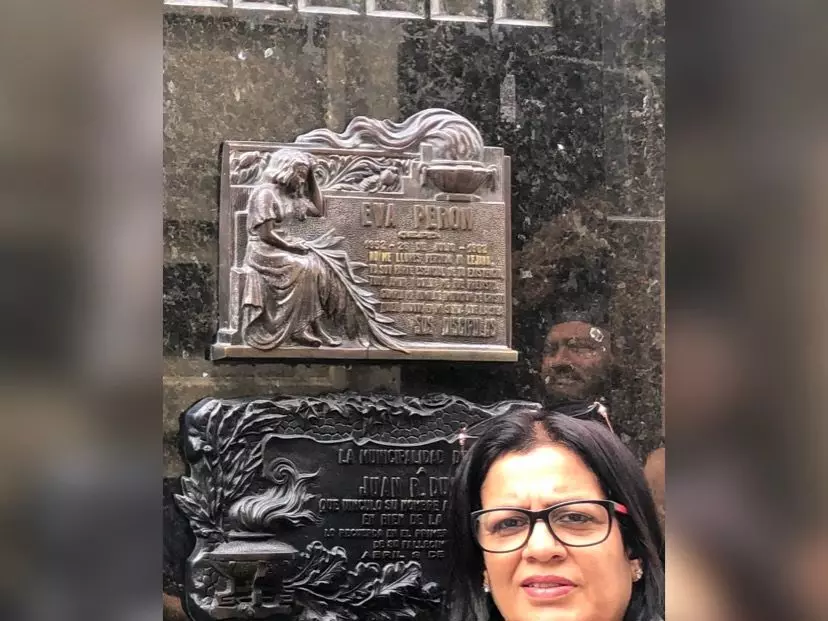Opinion: How Argentinian 'spiritual leader' Eva Perón's work can influence Andhra welfare schemes
Charity separates the rich from the poor; aid raises the needy and sets them on the same level with the rich – Eva Peron
By Newsmeter Network
Hyderabad: May 7 marks the birth anniversary of a remarkable woman whose beliefs are relevant even to this day not only in the country she was born in but in every corner of the world where hunger, poverty, and sickness plague mankind and where basic needs of life are not addressed and there is a huge economic disparity.
Revered by the working class, Eva Perón was known as the “spiritual leader of Argentina,” for her humanitarian work and fierce dedication to economic justice. I guess they thought she was spiritual because you need to be spiritual to understand the plight of the needy and reach out to them as a responsibility and not a chore or a charade.
When in this day and age, so-called leaders make a charade of caring for the poor and in the same breath fail to recognise genuine work done by others, it makes for the worst kind of injustice. As the wife of former Argentine President Juan Perón, Eva was instrumental in cutting government subsidies to the traditional Sociedad de Beneficencia (Spanish: Aid) which helped the traditional elite, and she replaced it with her own Eva Perón Foundation, which was supported by “voluntary” union and business contributions plus a substantial cut of the national lottery and other funds. These resources were used to establish thousands of hospitals, schools, orphanages, homes for the aged, and other charitable institutions across Argentina. Eva was largely responsible for the passage of the women’s suffrage (right to vote) law and formed the Peronista Feminist Party in 1949.
Closer home in Andhra Pradesh, some counter views about welfare measures taken up by the current government caught my attention. Upon a closer look at some details and data, I realised that the AP government so far has done some path-breaking work for marginalised sections in the state.
The above statement is true because of two important observations:
1. Every single section of society that needed financial inclusion has been addressed to the extent possible in the last four years.
2. The organised structure and process by which aid is being dispensed, with the utmost dignity and with the least trouble very effectively.
This said then why the murmur about why aid has popped up, why so much, etc?
While the debate on the why and how of financial aid and subsidies is a contentious one, it’s not surprising to note that a chant against it is used in this case purely for political gain. If one puts one’s ear to the ground, one will have two clear narratives.
The first one from beneficiaries who are most satisfied with both the aid and the manner it reaches them
The second one I discovered could be blamed on the first one.
When a government does all that it promises, detractors will spread a message about how it’s not good for the economy to spend on aid. This is done clandestinely and not in the open by the two-faced political leaders and so I am not surprised.
This will not deter a leader who is truly determined and committed to fulfilling his mission. Leaders who spread false propaganda by claiming that their regimes and policies built some industries and infrastructure whose time had anyway come will set up for long-term impact but aid concerns itself with today and cannot wait. The morsel to feed the hungry child bothers a mother today, the old and the infirm need support today, and a student studying today needs immediate aid for his or her future because lives and livelihoods cannot sustain themselves just with prospects of the future. If not taken care of in the present, they might perish—both lives and opportunities. A clear balance is required and that is very much in place.
These so-called statesmen spreading lies about aid coming in the way of economic growth need to re-think their ways of negating good by spreading lies. To remain in the memories of the world like Eva Perón needs honest commitment and a lot of grit and determination. Eva Perón died at the age of 33, and though the number of years she lived was short, the impact of her work was immense, and continues to be an inspiration to leaders across the world.
Author- Rani Reddy, an Advertising, Marketing & Media professional. A proud mother, Avid reader, and traveler. She has worked and lived in various cities in India. When not traveling she enjoys watching the world travel by.